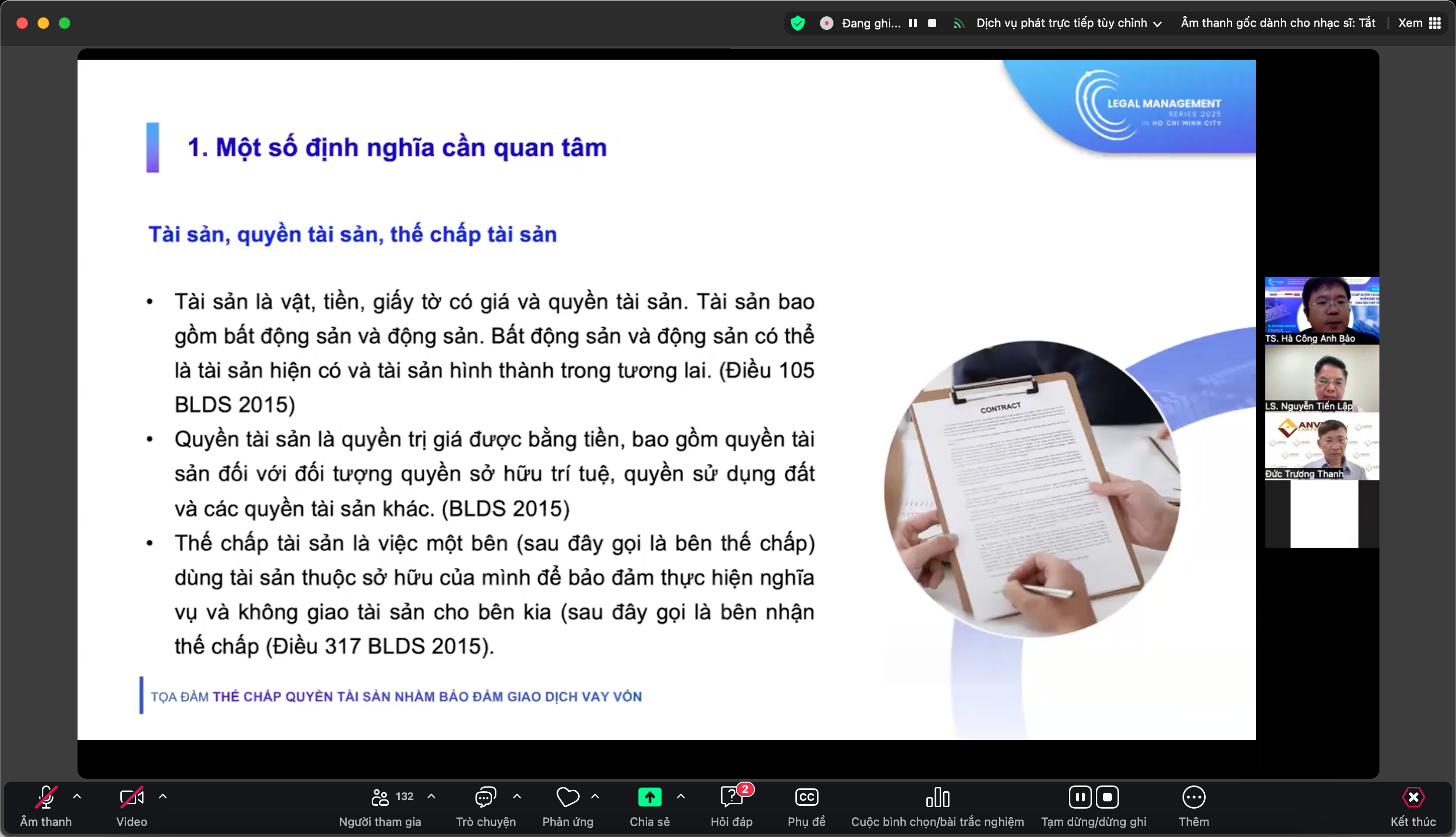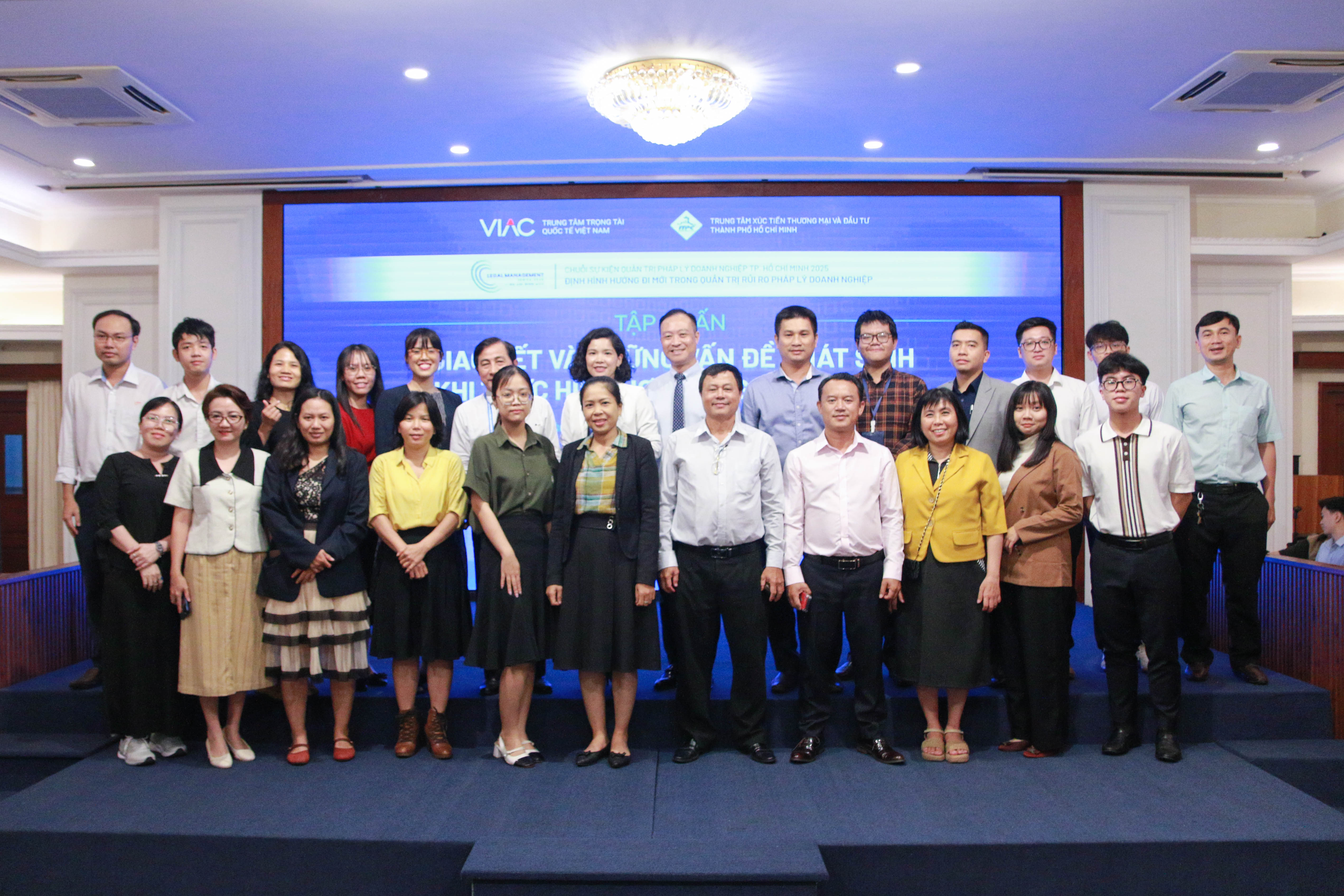As part of the Legal Management Series (LMS 2025) in Ho Chi Minh City 2025, the Online Talkshow “Pledging property rights as security for loans” focused on an in-depth discussion regarding the use of property rights as collateral for mortgages. The event was led by Dr. Hà Công Anh Bảo – Head of the Faculty of Law, Foreign Trade University, Arbitrator of VIAC, and featured discussions with speakers: Dr. Nguyễn Tiến Lập - Senior Managing Lawyer at NHQuang & Associates Law Firm, Arbitrator of VIAC, and Mr. Trương Thanh Đức - Director of ANVI Law Company Limited, Arbitrator of VIAC, attracting the participation of over 100 delegates.

Beginning the Talkshow, Dr. Hà Công Anh Bảo – Head of the Faculty of Law, Foreign Trade University, Arbitrator of VIAC – delivered an introductory presentation clarifying the legal criteria for property rights that are permitted by law to be used as collateral. According to the Civil Code, property rights eligible for mortgage must satisfy three conditions: they must fall under the ownership or the right of disposition of the mortgagor; they must be capable of quantification, valuation in monetary terms; and they must be transferable to the mortgagee. Mr. Bảo emphasized the distinction between existing property rights (such as an accrued right to receivable) and future-formed property rights (such as the right to exploit profits from an ongoing real estate development project). In his view, this distinction is particularly significant, as future-formed rights generally entail greater risks and therefore require more stringent control measures from lenders in general, and banks in particular.
The experts also shared their perspectives on the practice of mortgaging property rights in loan transactions. Accordingly, Mr. Trương Thanh Đức noted that, in practice, enterprises have mortgaged various types of property rights. The most common include right to claim debts, receivables and other payment entitlements; rights to exploit and manage investment projects; rights to lease and sublease; rights to benefits, profits, and other advantages arising from contracts; and rights to compensation for damages. Other types, such as intellectual property rights or rights to capital contribution, were also mentioned, but they have been less commonly accepted due to difficulties in valuation and enforcement through liquidation. The experts further highlighted a recent trend of mortgaging digital assets, such as data, software, or platform exploitation rights, although the current legal framework remains unclear, making the liquidation of such assets a significant challenge.
The legal risks and obstacles in mortgaging property rights were also rigorously analyzed by the experts. According to Dr. Nguyễn Tiến Lập, enterprises often face difficulties in clearly describing the mortgaged subject matter, which easily leads to disputes during enforcement. Certain property rights are subject to legal restrictions on transfer, such as the right to use leased land with annual rental payments or the right to exploit natural resources. In addition, disputes may arise when the same property right is mortgaged multiple times or when ownership of the right is contested. Even where the contract is valid, the liquidation of property rights - particularly intellectual property rights or other intangible assets - cannot be easily carried out. Therefore, the experts recommended that security agreements should be drafted in detail, that secured transactions be duly registered, and that additional security measures be employed to mitigate risks.
From a dispute perspective, Dr. Lập also pointed out a number of situations arising in practice, such as disputes over debt claims, disputes concerning project exploitation rights, and disputes relating to intellectual property rights. In addition, Mr. Đức analyzed various dispute resolution methods, including negotiation, mediation, arbitration, and litigation. Among these, he assessed that commercial arbitration is highly valued for its flexibility, confidentiality, and enforceability of awards, making it particularly well-suited for complex commercial disputes. Accordingly, enterprises are advised to include a dispute resolution clause in their security agreements from the outset to avoid disadvantages in the event of a dispute.
The Q&A session with participating businesses was highly engaging, focusing on practical issues such as the handling of property rights in cases of customer bankruptcy, the possibility of mortgaging software or data, and the protection mechanisms available to mortgagees when debt claims are disputed. The experts provided a number of practical analyses, emphasizing the importance of clearly drafted contracts, transparent registration procedures, and the selection of an appropriate dispute resolution forum.
In conclusion, Dr. Hà Công Anh Bảo summarized four key points: the necessity for a clearer legal framework on property rights eligible for mortgage; the standardization of valuation mechanisms and registration of secured transactions; the encouragement of utilizing digital assets and intellectual property, accompanied by risk management; and finally, the strengthening of effective dispute resolution mechanisms, in which arbitration is regarded as a strategic choice for enterprises.
▶️ Watch the Talkshow at: https://www.youtube.com/watch?v=L2yUuU4suN4
--------------------------------
INFORMATION ON EVENTS IN THE FINANCE - BANKING SECTOR | LMS 2025
 | The Conference "Legal framework and solutions for business capital mobilization" More details Here |
 | The Training workshop “Instructions for drafting loan agreement and resolving contract performance issues” More details Here |